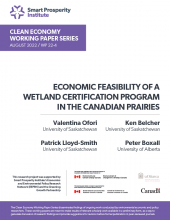By: Valentina Ofori, Patrick Lloyd-Smith, Ken Belcher and Peter Boxall
This paper assesses the economic feasibility for a novel market-based instrument for wetland conservation – a certification scheme for agricultural products in the Canadian Prairies. Agricultural producers that restore wetlands on their land would potentially be able to recoup their costs by receiving a price premium for their crops. To assess consumer demand for such a scheme, the authors designed and administered a stated preference survey to the public in Alberta, Saskatchewan, and Manitoba. The survey included a discrete choice experiment to elicit consumer preferences for attributes of wheat flour including whether the wheat was grown on a certified wetland friendly field.
The results indicate that consumers are willing to pay an estimate of 28%-40% more for wetland certified wheat,suggesting potential market demand for a wetland certification scheme. Employing random parameters and latent class logit models, we find substantial preference heterogeneity in consumer preferences and regional differences across the three Prairie Provinces. Consumer price premiums were then translated into expected changes in producer net returns and find that the benefits of adopting the wetland certification scheme outweigh the wetland restoration costs for a typical Saskatchewan field. The results suggest that this voluntary wetland certification scheme can be a useful addition to the policy toolbox and assist policymakers in formulating efficient and sustainable wetland management policies.
READ THE WORKING PAPER: Economic Feasibility of a Wetland Certification Program in the Canadian Prairies
Suggested Citation: Ofori, Valentina,Lloyd-Smith, Patrick, Belcher, Ken and Boxall, Peter. Economic Feasibility of a Wetland Certification Program in the Canadian Prairies (September 2022). Available at the Smart Prosperity Institute Clean Economy Working Paper Series: https://institute.smartprosperity.ca/publications/wetland-certification
The Clean Economy Working Paper Series disseminates findings of ongoing environmental and clean economy work conducted by researchers from a range of disciplines. These working papers are meant to make results of relevant scholarly work available in a preliminary form. Although these papers have not undergone a peer-review process, they meet general standards of scholarly excellence. The views expressed in these working papers are those of the authors and do not necessarily reflect the opinions of Smart Prosperity Institute.



